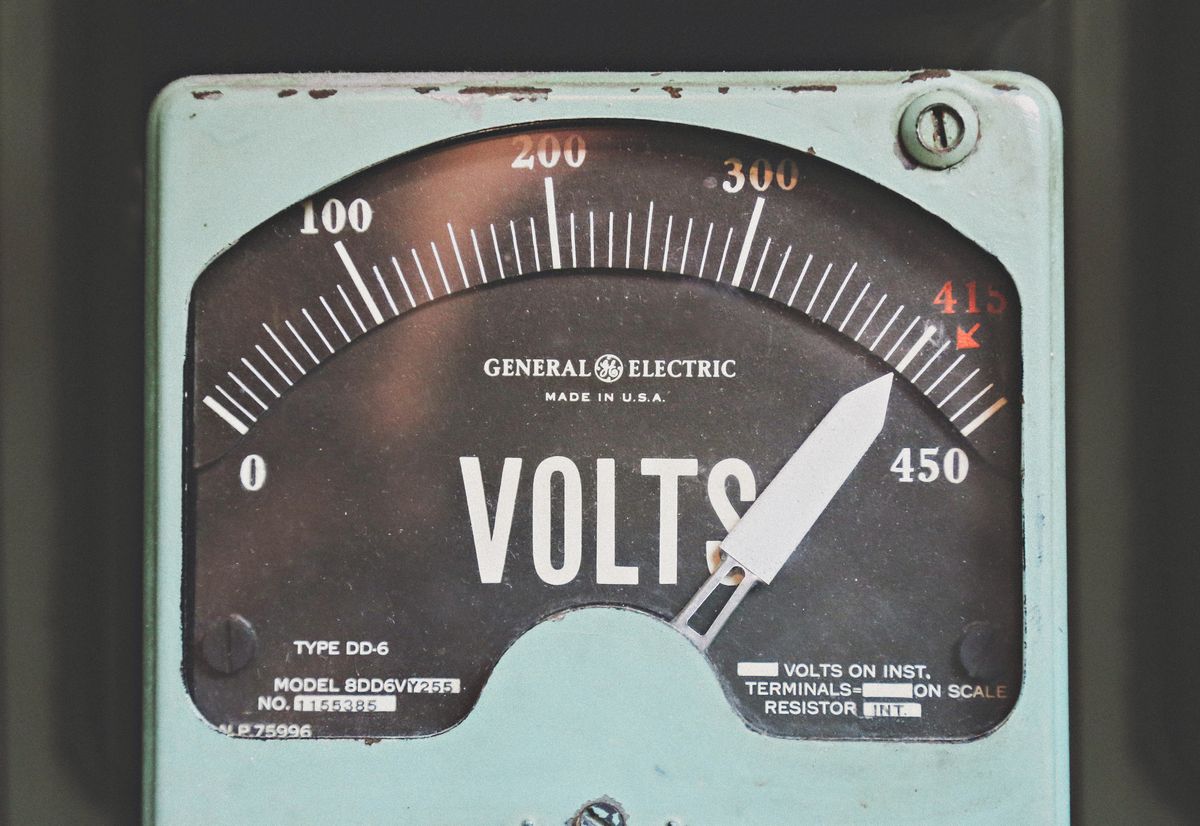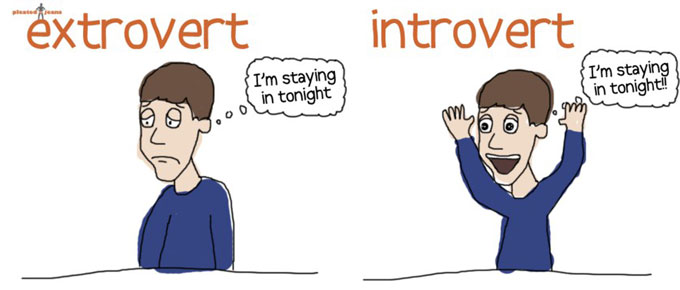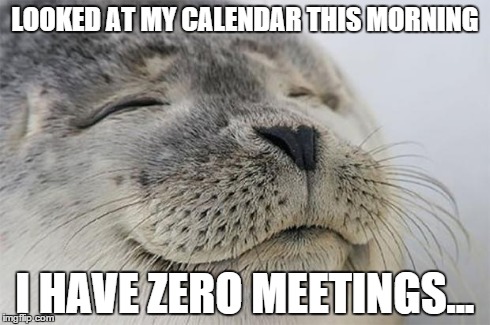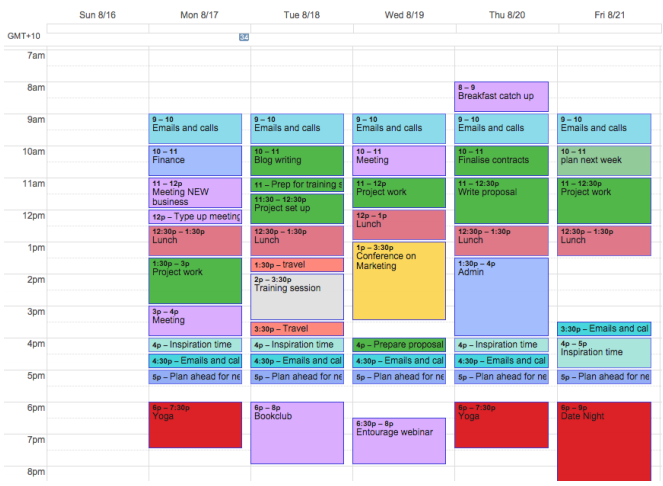Know Yourself, Manage Better: Part 2 – Introversion vs. Extroversion
Learn how understanding your energy can help you put your best into your projects, team, and the things in your life that are important to you.

This is Part 2 of the blog version of a talk I gave at the Digital Project Managers meet-up on November 28, 2016. For Part 1 see Know Yourself, Manage Better: Part 1 – Daily Self-Reflection.
In Part 1, I start with the premise that project management is, at its core, people management. I also posit that if you are intentional about self-reflection and build self-awareness, it will help you plan and manage your presence, time and energy in ways that will make you more effective and efficient. The idea is that before you manage others well, you should learn how to manage yourself.
In addition to identifying your personal values and practicing daily reflection, understanding where you sit on the introversion/extroversion spectrum can be helpful in being mindful about how you manage your energy. How you manage your energy has a great impact on your interactions with your clients and team.
Introversion vs. Extroversion: It’s all about energy

Introversion and extroversion are often characterized in popular culture as how shy or outgoing a person is. However, in their original conception, Jung intended,
“the words to describe the preferred focus of one’s energy on either the outer or the inner world. Extroverts orient their energy to the outer world, while introverts orient their energy to the inner world.” The Meyers-Briggs Foundation
Where you sit on the introversion or extroversion spectrum is associated with where you put your attention and get your energy. Generally speaking, extroverts tend to gain energy from being around other people. Extroverts actually find their energy is sapped when they spend too much time alone and recharge by being social. Introverts tend to lose energy from being around people for long periods of time, particularly in large crowds, and recharge by being alone.
How do I know if I am Introverted or Extroverted?
1. Personality tests

If you are interested in seeing where you sit on the introversion/extroversion spectrum, you can take one of many online personality tests. There are many available, each with their own flavour and perspective, but they are valuable in that they provide you with another tool for self-reflection. You should take your results with a grain of salt since they place the vast uniqueness of humanity into fairly defined boxes, but they also help us understand, or at least consider, our own tendencies.
I am most familiar with the Myers-Briggs Type Indicator which you can try for free or do an official paid version. Regardless of which one you try, these tests can give you an idea of whether you lean towards introversion or extroversion, which is helpful in clarifying where you get your energy.
2. Self-Assessment
If you don’t want to take the time to do one of the online personality tests, you can also just reflect and self-assess about where you get your energy from. Consider:
- How do you feel after making small talk at a networking event?
- How do you feel after a one-on-one client or team meeting?
- How do you feel after a night out with friends?
- How do you feel after spending a day on your own?
- etc.
There is no hard and fast rule, and you might vary on how you feel depending on the circumstance, but you can likely guess at whether you are someone who gains energy from others or by being alone. For example, I am most definitely an introvert. While I enjoy spending time with others, I know that no matter how awesome you are, or how much fun an event is, I will feel a little (or a lot) drained.
How does knowing if you are an introvert or extrovert help make you a better project manager?
Taking the personality tests and all that is fun, but what does it have to do with being a better project manager?
It helps you understand where you get and lose energy, which will help you make intentional decisions about how you manage your time and interactions.
This allows you to be more mentally available for your team and tasks that require different types of mental energy.

For example, let’s say you manage a team of 5 people and you have to do quarterly 1-on-1’s with them. An extrovert might want to schedule those meetings back-to-back over the course of a day because, for them, it will be fun and energizing. However, an introvert would be better off spreading those meetings out over a few days. Otherwise, you are likely to be more and more drained with each one-on-one they do. The team members who get the last few time slots are not likely getting you when you are at your best.
Self-awareness leads to awareness about how you impact others
As a project manager, you are in a leadership position so your decisions, actions, attitude and presence all make a difference in others' lives. If you are tired, frazzled, frustrated and/or overwhelmed all the time it feeds back into how you communicate with clients and your team. It can impact their expectations of you, and create an atmosphere of anxiety. Others often mimic the behaviour of those around them, especially their leaders. Ask yourself:
- What does your behaviour say is acceptable?
- Are you paying attention to how your own energy levels are impacting your work and your team?
- What are you doing to manage your energy in an intentional way?
The following are a few tactics that will help you to come up with better answers to those questions.
How can I apply this knowledge?
Consider the following, depending on if you consider yourself an introvert or extrovert:
1. What time of day do you take meetings?
There is no rule to this, but it is worth thinking about when you are at your highest levels of energy for certain types of tasks. For example, as an introvert, I prefer to do focused work at my computer in the mornings. It is when I am at my highest mental energy for critical thinking tasks. I avoid taking morning meetings because I am always drained after and find myself less productive in the afternoons. Instead, I try to schedule all my meetings in the afternoons so that I can switch gears to spending social energy with the people I meet.
An extrovert might find the opposite true where morning meetings get them pumped up for a solid afternoon of work.

2. How many meetings do you schedule in a day/week?
This comes back to being cautious about not burning yourself out. For example, if I schedule an entire day of meetings and follow it with a networking event, which my role often requires, I am often completely useless the next day. I am, in fact, likely useless at the networking event because I will struggle to be fully engaged after a full day of meetings. If I book a dinner/networking/board meeting every night of the week, it will take me several days to recover back to my normal energy levels. I have to think hard about what I commit myself to and how often.
An extrovert, given the same schedule, is likely to thrive and feel very energetic with so many interactions. Extroverts, instead, have to consider how much alone time they have and if they need to fill it up.
3. How do I manage my schedule in an intentional way?

Time-blocking is an effective way to visually block off sections of time in your calendar to intentionally plan how you spend your time. It helps you to figure out when you are going to fit certain types of tasks and meetings in your schedule. It also gives you a visual indication for when you are over or under-booking yourself. In this vein, time-blocking is a good self-care tactic. It clearly shows how full (or empty) your schedule is, which contributes to how you make decisions about when you book your time.
Summary
Having a general idea of where you land on the introversion/extroversion spectrum allows you to identify how you are most likely to gain and lose energy. Your energy levels impact how you perform, your attitude, and how you manage your clients and team. Understanding your own energy needs gives you the opportunity to be intentional about your time and energy management. This self-awareness can help you put your best into your projects, team, and the things in your life that are important to you.
Share
Ashley Janssen

Productivity consultant, writer, speaker, serial entrepreneur, chaos calmer, introvert, cat-lady. Lover of books, fitness, old fashioned’s, basketball, and video games.
Follow me on
Twitter
or
LinkedIn.
Hire me for
1 on 1 productivity consulting
or
speaking.
Related articles

Why Are You Productive For "Only" 5-6 Hours Each Day?

When You Do Things Matters


Comments ()